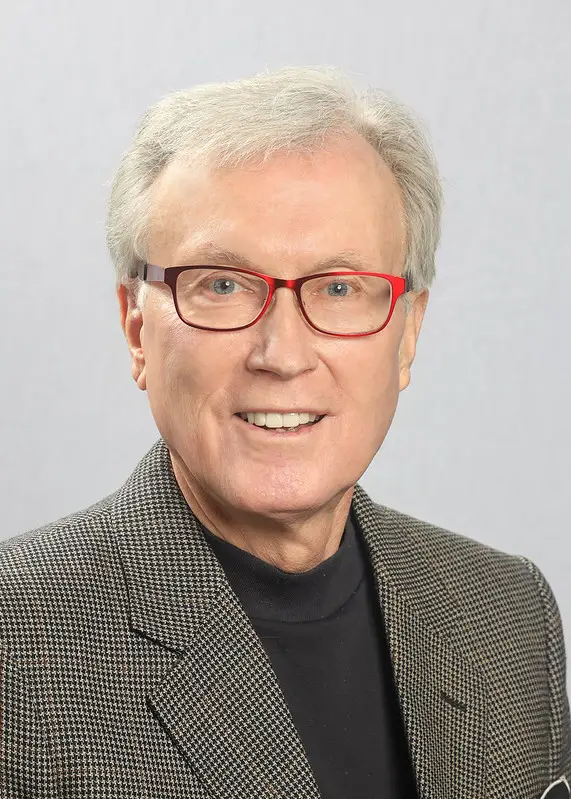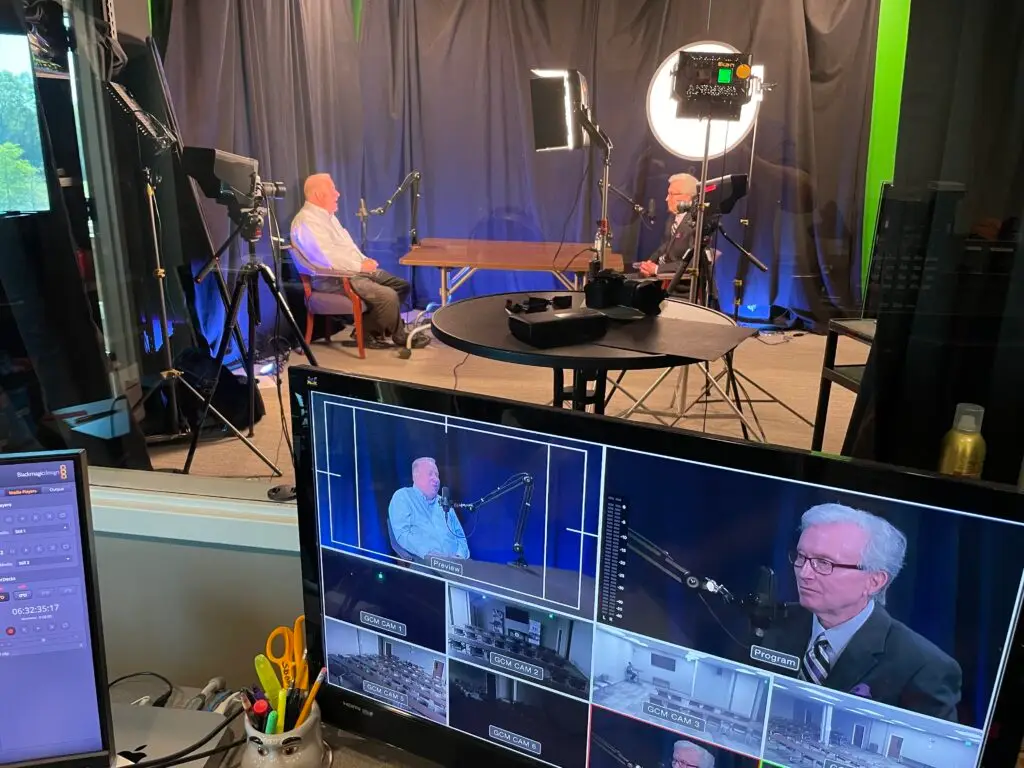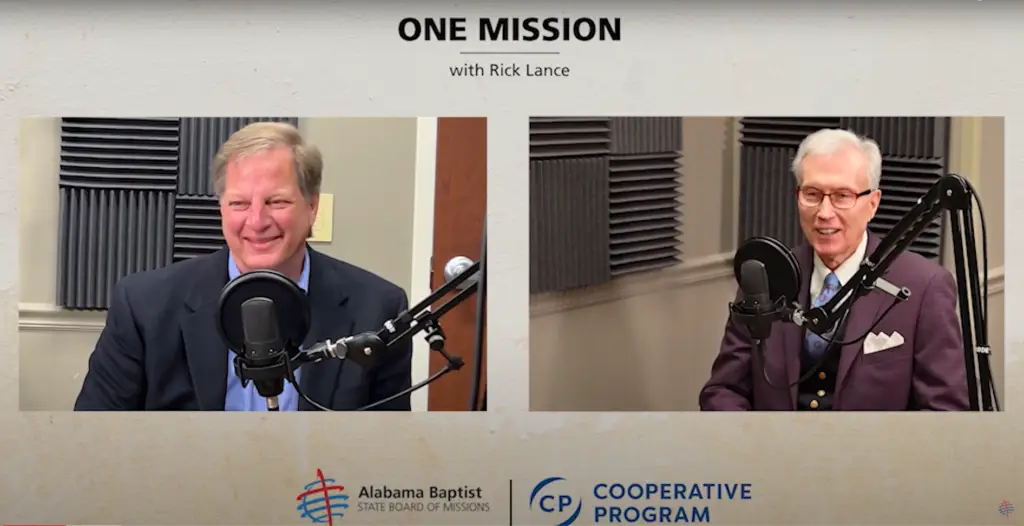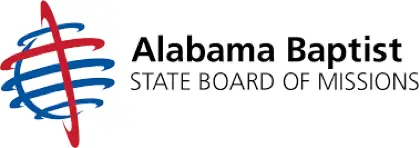This conversation is a transcript from One Mission Podcast. If you would like to listen to this episode, visit ALSBOM Podcasts.
Dr. Rick Lance:
Hello listeners and welcome to One Mission, the podcast. We’re glad to have you in the listening audience. And today we have a dear colleague here at the Alabama Baptist State Board of Missions, Rick Barnhart, who gives leadership to associational missions across our state and collaborating with our associational missional leaders and their context, and also gives premier leadership and oversight to what we do in church planting efforts across Alabama and actually beyond. So we are indeed glad to have Rick Barnhart here and Rick’s been at the State Board of Missions now, what, 11 years?
Rick Barnhart
Yes, sir.
Rick Lance:
Yeah. I thought I remember that pretty well. And he’s been a welcome addition and we thank you for taking some time out of your day and to help us better understand what it is we’re seeking to do at the State Board of Missions in general and in associational missions and church planting in particular.
Rick, tell us a little bit about your conversion and your call to ministry. I think our listeners always want to hear about one’s conversion and call because it helps us relate to each other.
Rick Barnhart:
Well, for sure. I grew up in Daytona Beach and came to know the Lord when I was 11 years old. I think some of that was probably just so much work with Sunday School teachers, RA’s, and then even in the Boy Scouts. We had a troop that was sold out for serving the Lord in different ways. But it wasn’t until I was at the University of Florida Baptist Campus Ministries there that I really understood what it meant to have Christ as Lord of my life. And so my life really changed significantly at the University of Florida Baptist Campus Ministry, became responsible for small group leadership, those kinds of things.
Rick Lance:
That’s a good shout out to collegiate ministry.
Rick Barnhart:
Absolutely. Yeah.
Rick Lance:
Thank you for that.
Rick Barnhart:
I’m sold out for BCM.
Rick Lance:
Well, that’s great! Now that’s your conversion and your call to ministry.
Rick Barnhart:
Yes. At first I was looking at serving the Lord as a counselor on staff at a church. So I worked on my master’s work at Southern Seminary in counseling pastoral care and counseling, and was disappointed that really, with a master’s degree, there wasn’t a whole lot of opportunity to serve in churches in that capacity. So as the Lord allowed me the opportunity to move back down to Daytona and serve with the church that I grew up in, I realized that really I was called to pastor. So I became involved in the first church that I served full-time. I was responsible for worship leadership, education, and school administration of a school with 300.
So that was kind of a shock for your first full-time ministry. But, over time, the Lord just honed my skills and honed the opportunity to serve Him as a pastor. So it was a building up to the calling of First Baptist Silver Hills, my first pastorate.
Rick Lance:
Well, that’s well stated. I think you’re also working on a DMin. Talk to us about the areas of ministry there.
Rick Barnhart:
Well, the DMin is specifically related to strategy development for rural associations in Alabama. Out of our 74 associations, we have 66 rural associations and a lot of the work that’s been done for helping them develop strategies, helping associations develop strategies, has been for the urban setting. Yet most all of the associations across the nation are rural, and they don’t have the resources that our urban associations might have to do those self-studies and to bring in consultants and spend $5,000 or $10,000 for that kind of study.
So my goal has been to develop that tool that they could use, through the DMin studies, to be able to work toward evaluating themselves and then come out with a strategy for a couple of years.
Rick Lance:
Well, I applaud you. We applaud you for doing that because there’s really a feeling of neglect among those in the rural areas because we’ve urbanized so much, not only in Alabama, but across the country. Urban areas are the concentration of the people, therefore, it gets a whole lot more attention. And yes, because the people are there, church planting seems to be more of a natural setting. But indeed as well, we need, of course, to minister in the rural areas because, as you mentioned, a host of our counties are still very rural. And we may have a small town county seat, but even that would be considered small town America.
So thank you so much for doing that. I know that you’ll be able to put that into practice, probably already are, in relationship to rural church ministry and associational leadership there. Talk to us about what the role of an associational leader is as a strategist and as a leader in the local setting.
We’ll have next week a real associational missional leader on the local setting. But from your vantage point, having been an associational leader, having been a church planter, having been a pastor, and now a state missionary, you would have a unique perspective on that. So would you mind sharing with us?
Rick Barnhart:
Absolutely. What I really look at when I think about associational missionary leadership is that they have three primary areas of concern that they’re focused on. The first one is gonna be inside the new name that the SBCAL, the Southern Baptist Conference of Associational Leaders, developed a couple years ago with a bunch of surveys and a bunch of work that they wanted to be called themselves associational missionary strategists.
Well, I personally favor associational missionary and part of that is because they should be strategists. That’s part of their responsibility. And they’re gonna see what’s going on in their county or their region, whatever they’re responsible for, but primarily counties in Alabama. So they’re gonna see from a 50,000 foot perspective the whole county. What needs to take place education wise, what needs to take place with their FEMA, their emergency management groups, all the different priorities that the county might have – that associational missionary needs to have a good relationship with county leadership, fire departments, police departments, sheriff departments, all those kinds of folks, so that he can understand how to help his churches relate to the needs that might be in their county. So he is looking at it; he’s being strategic. How do I get this church on this side of the county to partner with this church over here? That’s a part of church revitalization as well is that associational missionary is gonna be trying to balance out the larger healthy churches supporting and working with some of the smaller churches. So strategy.
He’s also gonna be the team leader for whether it be disaster relief or whether it be Women’s Missionary Union, those kinds of groups that are going to be active inside of his association. He needs to be sure that they have the tools they need, the resources they need. So he’s gonna be a networker among his teams that are part of that work in that association.
And then finally, a term that I prefer over “pastor to pastors” is “shepherd to shepherds.” Because you’re looking at pastors, you’re looking at worship leaders, and you’re looking at all kinds of other responsible folks, youth leaders, and they’re not necessarily gonna be full-timers. They’ll be folks that are partially funded and they’re gonna need resources. They’re gonna need ministry in critical times of their lives when there might be some conflict in the church, or there might be some personal devastating event in their own lives.
So those are the three major areas that I see an associational missionary providing good ministry for his association.
Rick Lance:
Well, that’s a brilliant way to express that. I like it. And to say that you have someone who’s a strategist, they’re strategists in ministry, obviously, trying to help others strategically be on mission with a Great Commission, and then a network of leaders, of workers, it resonates well with me because ministry is all about relationships. It runs on the rails of relationship and networking is just absolutely imperative.
And then to be a shepherd of the shepherds; I’ve tried to see my role in that way through the years. That’s real hard to do sometimes, but shepherding the shepherds would be certainly one of the things I’d hope all of us are doing here at the State Board of Missions. So I applaud again that description.
I would add somewhere that, and it probably comes under the strategist or it may come under the networking or whatever, but disaster relief strategist locally, that we depend upon our local leaders to help us as we seek to respond to those inevitable times of disaster. And I think that’s worked well.
I might add to you who are listening, Alabama Baptists and our State Board of Missions, we value our relationships with churches. We exist to assist churches. We further value how to praise and put a lot of worthwhile emphasis on having good relationships with our associational leadership.
Speaking of titles, titles are titles, but that means something ’cause it really connotes ministry assignment, Director of Missions is okay. I like that all right. Of course I have director in my title, but I try to go by the terminology of state missionary executive director cause some of the urban ones, a couple of three urban ones have that. But associational missionary, I’m glad you mentioned that because even though it sounds a little dated, I think it does cover what we really see and hope for in our associations. I think the term you mentioned a moment ago is coming out of the national organization is associational missional strategist. And that’s good. But as you have well indicated, the associational missionary has far more than just a strategist part of his role. So well stated, Rick.
You also give oversight to church planting. Now, I must say, after 25 years of being here, I helped redesign, or really redesign the Office of Associational Missions and something else, and then put the something else we took off of it, I think it was cooperative missions, which didn’t really speak specifically to what we wanted to do. So we renamed and retitled the office Associational Missions in Church Planting. And we’ve made a yeoman’s effort at having church planting in Alabama become a premier emphasis because we do have some churches that are not as healthy as they once were, and who knows, in a matter of time, they may not actually be functioning and ministering in the days to come. So we need churches for all kinds of people and all kinds of places and all kinds of emphasis. And we have tried to do a better job of that. It’s a work in progress.
I certainly appreciate what you and your people in the office there have done to help promote that. Because we have 3,230 churches approximately, and we feel like, over a period of time, we have to do not only replacement of those churches that are transitioning to replants I hope if they’re going out of, if you will, out of their own kind of ethnic or Anglo basis and being able to transition to a replant somewhere else.
So church planting and replanting are so, so important to us. Talk about the importance of that a little bit. I’ve said too much, now you say something!
Rick Barnhart:
Well, the thought goes back to the relationship with associations. To me, I think it’s critical to understand, and the listeners to understand, that churches are not planted in Alabama by Alabama Baptist State Board of Missions. They’re planted through churches that are planting churches in their associations. So our partnership with associations are critical.
We may be the only State Board of Missions in the nation that will not plant a church, will not assist a church in planting, that’s a better way of wording it, without the associational partnership. If the planter does not have a relationship with the associational missionary, if that church plant does not have approval of the association through their executive committee process or whatever process they might have, then we won’t become involved with them. We might assist them with assessment and we might assist them with training and other things like that, which is, I’ll mention that in a second. But those things, any financial support, doesn’t come without the association’s approval, which means the churches in that association approve of that ministry taking place.
So once someone comes and responds to us, whatever way that we might find out that they’re interested in planting in Alabama, we refer them to the associational missionary. Then we refer them to the different websites that we have that allow us to assess them. So we go through an assessment process and it takes several months to get through that part of the process. Then they will also be involved in a cohort training, which is gonna be somewhere between seven to eight months of studies, different materials, working with small groups, and understanding what it means to plant a church in their community. Then they’ll also have a mentor assigned to them, or a coach assigned to them that will stick with them for two years.
So that’s an important part of success, and that’s what we’re looking at. Of course, we want to have successful church plants and we also have a great record on those successes. Over the last 10 years, we’ve just seen that improve and that’s been a good thing. So the follow-ups after the assessments and after the training and then the opportunity for them to be involved with different leaders that we have in place, the coaches. It’s a wonderful improvement I think over the last seven or eight years especially to see this kind of support structure out there for our planters.
Rick Lance:
Well, I appreciate that. It’s well stated again. I might ought to add that if you’re listening and would be interested as a pastor who would like to do church planting, then, of course, the process has been verbally laid out, but we have much on our website that will help you be able to get a good start.
What we really see the viability of churches five years out in Alabama. The percentage is very high that they’ll still be existing and then 10 years out, which is really a good point of reference as well. Alabama books the average on how many of them are still viable and ministering effectively. So I’d like to say to all of you, through the Cooperative Program and through the Myers-Mallory Offering, our state missions offering, we’re able to support church planting. Therefore it is again, most important, very important that we have good church planters that are well-positioned, well-trained, well-coached to be able to do the ministry that God’s called them to do. We value that highly.
We just came off, locally here as we make this podcast, we came off a Serve Tour or Serve Montgomery. The River Region, including Montgomery area that would go into Lowndes County, cause some of those churches are in the Montgomery Association; it would cover Elmore County north of the river, so to speak, if you’re not aware of the Alabama River; and the Autauga County, which concludes Prattville. That seemed to have gone well. I was involved and I was kind of a floater going on various locations, working with the North American Mission Board, working with those local associations, and also the partnership with the State Board of Missions.
I might add to all of you who are listening, this is a picture perfect example of cooperation at its best and it seems to have had a resounding, productive impact in these areas. You wanna talk about that a little bit because you were intricately involved?
Rick Barnhart:
Well, one of the fascinating things is Monday when I returned to the facilities, I took a tour, so to speak, of the different offices and we did something different than any other state convention in their involvement with their Serve Tours. Our staff was very much, all the ministry support staff as well as missionaries, as many as possible, were involved in different projects. 48 different projects across that region that you spoke of with individual project leaders responsible for the project. And then the relationships with the three associations and the State Board and Send Relief in the Serve Tour part of the team. I
It was one of the best opportunities I saw for partnership over the last 10 years of ministry here at the State Board. And I think that that was a real bonus for our staff, a real bonus for the relationships and partnerships, and I’m hoping to see a lot of things yet to come from the fruit of that week.
Certainly it was a two year process. It wasn’t just something that happened overnight. We began working with the Send Relief Tour two years ago, making plans: Where’s it gonna be? How’s it gonna happen? And then the resources that we provided as a State Board of Missions, and the resources our associations provided – ministry to pastors, ministry to churches, elementary schools, just all across the city. Just wonderful, wonderful projects.
Rick Lance:
That’s great! And coming from that, listeners, we are planning a customization of that kind of approach and using “Love” with a cross in the middle and then the city or area we’re in. And the next, really our first foray into this and customizing it, is Love Mobile. And we’re looking forward to that. It will not be as of the magnitude of scale that we had here in the Serve Tour Montgomery region or the River Region because we’re going to do it simply from the State Board of Missions. We will not have the resources of North American Mission Board, so therefore we’ll have to do it much more inexpensively, but much more targeted specifically for that area.
Do you want to give a brief thought about how that looks for the future?
Rick Barnhart:
Well, so far, a significant amount of work has been done in just the last four days in making arrangements and putting a time schedule together. We’re looking at March of 2024, and it will be in Mobile. We’re looking at working with Thomas Wright and his team, four different areas, whether it be Citronelle or Prichard area or the south part of Mobile or the west part of Mobile. So there are four different places with several different weekends involved rather than it being a one weekend event. And that’s so that some of the resources that are gonna be made available through the State Board can be resourced across the city over different weekends instead of keeping it all in just a few select sites.
We are looking at reducing from say 48 projects to about 10, and funding those 10 projects. And they’re gonna be more evangelistic event oriented than trying to help an individual or help just a specific school. It’ll be spread across the city.
Rick Lance:
Well, I love the concept and I believe it could be something we could take across the state, various localities over a period of time.
Rick, I want to thank you personally for being a part of our team here at the State Board of Missions. You’ve done an outstanding job. You’re highly respected here, not only on the staff, but across the state. If you have not met Rick Barnhart, you need to meet him and I hope you’ve had an introduction to him in these brief moments we’ve had together.
Listeners, what we try to do in One Mission, the podcast is to talk to leaders and to talk about ministry and missions to help us better refine our skills as we seek to be on mission with a Great Commission.
It is my joy, periodically, to be able to host this podcast, and we hope and pray that it meets your needs as you look to your own ministry. If you want to send in an email to us, you can go to my own personal email at [email protected], or you can go through the website and offer suggestions about questions that can be asked of various leaders or perhaps leaders that might need to be interviewed in the days to come.
I want you to know, dear people, that we’re here for you at the Alabama Baptist State Board Missions. We exist to assist churches and church leaders. We’re proud to be able to do it. We know we’re only a part of the team, but we’re glad to be a part of the team. We love Alabama Baptists, and we look forward to continuing to serve as we give through the Cooperative Program as we seek to be on mission with a Great Commission. We don’t take that for granted. We take it seriously. All of us need to be Great Commission Christians, Great Commission leaders. Thank you again for joining us on One Mission, the podcast.




